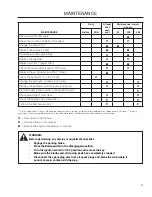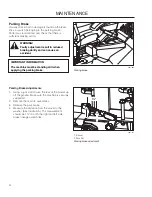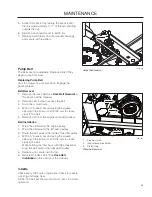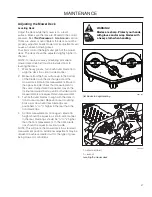
53
LUBRICATION
53
Transmission Purging Procedures
Due to the effects air has on efficiency in hydrostatic
drive applications, it is critical to purge the system.
These purge procedures should be implemented
any time a hydrostatic system has been opened to
facilitate maintenance or any additional oil has been
added to the system.
Resulting symptoms in hydrostatic systems may be:
• Noisy operation.
• Lack of power or drive after short term operation.
• High operation temperature and excessive
expansion of oil.
Before starting, make sure the oil tank is at the proper
oil level. If not, fill to the specifications outlined in this
section.
The following procedures are best performed with the
vehicle drive wheels off the ground, then repeated
under normal operating conditions.
1. Disengage the brake if activated.
2. With the bypass valve open and the engine
running at fast idle, slowly move the directional
control in both forward and reverse directions (5
or 6 times). As air is purged from the unit, the oil
level will drop.
3. With the bypass valve closed and the engine
running, slowly move the directional control in
both forward and reverse directions (5 to 6 times).
Check the oil level and add oil as required after
stopping the engine.
4. It may be necessary to repeat Steps 2 and 3 until
all the air is completely purged from the system.
When the hydraulic drive operates at normal noise
levels and moves smoothly forward and reverse at
normal speeds, the hydraulic drive is considered
purged.
5. After the vehicle has been used two times, the oil
level should be checked while the oil is cold and
adjusted accordingly.
















































